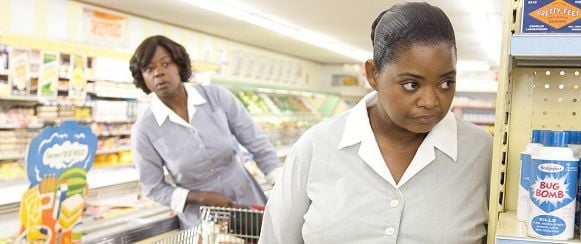‘The Help’: A feel-good flick that sugar-coats segregation
A movie about the Jim Crow laws shouldn’t be this cute
Share

Director Tate Taylor’s adaptation of Kathryn Stockett’s wildly popular bestseller, The Help, is bright, funny, and at times uplifting. But those aren’t necessarily desirable traits for a film about the lives of black maids in segregated Jackson, Mississippi in the 1960s—a town that saw some of the worst oppression and disenfranchisement of blacks in the South.
The Help centres around a young, white college graduate, Eugenia ‘Skeeter’ Phelan, and two black maids—Aibileen Clark and Minny Jackson. Skeeter (Emma Stone) is an atypical Southern belle—frazzle-haired, career-driven, and full of righteous indignation. She returns from university to find that her friends have all gotten married, had babies, and embraced an ugly, casual racism toward their black maids. Skeeter aspires to become a novelist and hopes to catch the notice of a New York book editor (played by a canny Mary Steenburgen) with a controversial book pitch—she will interview a group of black maids who spend their lives looking after white families.
The Help is an disturbingly palatable account of the beginnings of the civil rights movement in America. The depiction of Jackson is candy-coated, never lingering on the truly awful realities of segregation and oppression before a punchline or an endearing moment cheers you up. Major moral questions are glossed over with throwaway lines. I found myself wondering: why are the lives of these black maids filtered through this naive white girl’s story? At one point, Minny says to Skeeter, indignantly, “Why do you think black people need white peoples’ help?” She storms out, only to turn right back around and agree to cooperate. Later, when Skeeter publishes her book and the maids are implicated, I wondered what would happen to them. “Don’t worry Skeeter, we can take care of ourselves,” Minny reassures our white heroine, nodding and grinning. I wasn’t so reassured.
Nonetheless, the film showcases some fine performances. Viola Davis performs in a league of her own, bringing some real depth to Aibileen. The Oscar-nominee (Doubt) is complex in front of the camera, conveying deep sadness and hope at the same time. Octavia Spencer, as Minny, steals more than a few scenes as the eyebrow-raised, misbehaving maid who can’t contain her opinions. Playing opposite Minny is a delightful Jessica Chastain (Tree of Life), the loopy, white-trash outsider Celia Foote (their fried chicken lesson is laugh-out-loud funny). Surprisingly, the much-touted Emma Stone didn’t really stand out, but that may have been the fault of the script. Skeeter is a two-dimensional character seemingly designed to reassure us that not all whites were racist. Where her moral compass comes from (Her liberal arts education? She was born that way?) is never explained. It’s as if she’s the only sane white person in the movie—everyone else seems incurious, brainwashed, or wholly unreasonable. Her evil nemesis, Hilly Holbrook (Bryce Dallas Howard), is a cartoonish mean-girl villain whose motivations are similarly unexplained. There is no grey area—only good white people and bad white people.
The screening I attended had people laughing and crying (and had the critic next to me scowling with indignation). Frankly, I felt manipulated in much the same way I do after watching a particularly poignant episode of Grey’s Anatomy. The writer pulled my heartstrings, put the bad people in their place, and gave me a hero to look up to. The Help may have its heart in the right place, but ultimately it skims the surface. A movie about the Jim Crow laws and those who suffered under them just shouldn’t be this cute.